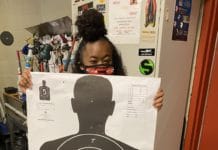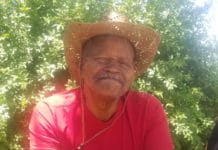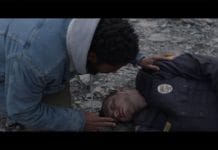
by JR Valrey, Black New World Journalists Society
This year’s San Francisco Black Film Festival, which starts on June 18, and will go for a month strictly online, will feature an illuminating film about the history of race and adoption in the United States called “70 Years of Blackness: The Untangling of Race and Adoption” by filmmaker Christopher Windfield. The subject of this documentary is Verda Byrd, a Black woman who was adopted in the ‘40s into a Black family only to find out 70 years later by surprise that both of her birth parents were white.
In the United States, race is a major fault line that in most cases determines the quality of life as well as access to resources to progress in life. In Verda Byrd’s case, due to a broken and uncaring adoption system, she experienced life thinking that she was someone she was not. I talked to filmmaker Christopher Windfield about bringing Verda Byrd’s story to the silver screen and what he learned about race and adoption in the United States after completing this film.
JR: How did you meet Verda Byrd?
Christopher Windfield: Verda had seen one of my films from a previous film festival and reached out. She explained to me her story, and I thought it would make a great documentary!

JR: What made you commit to telling the story of Verda Byrd?
Christopher Windfield: What made me commit to her story was the unique and rare case of interracial adoption and/or trans-racial adoption and how it affects people. Also, her story has a lot of historical relevance on the history of adoption. Also no one has considered doing a documentary on her life and I wanted to be the first.
JR: What made you include the New Orleans story that author Randall Kennedy told in this documentary? What is historically important about that case?
Christopher Windfield: It’s very important because it highlights that although these cases were rare, they did happen. There are several cases like Verda Byrd where babies of different races are raised by parents of a different culture and/or race. Randall Kennedy’s story gives historical context of how similar situations affected people and how our nation handled trans-racial adoption at that time.
JR: What is the difference between “adoption” and “unwed mothers”?
Christopher Windfield: Unwed mother refers to a person who has a dependent child or dependent children and who is widowed, divorced or unmarried, which can now be classified as a single parent. Adoption is the action or fact of legally taking another’s child and bringing it up as one’s own or the fact of being adopted. They both co-existed together, but before the term “adoption” was coined throughout our nation, “unwed mothers” referred to women who simply weren’t married and wanted to give their babies up for adoption.
“Unwed mothers’ home” assisted in allowing women, preferably single or unmarried, to not only give their unborn children up for adoption but also rest up or recuperate after giving birth to that child. The term unwed mothers was later frowned upon and that’s when the term “adoption” and adoption agency was born.
JR: And what are throwaway babies?
“Race during the ‘50s to the ‘80s and even today shaped the entire adoption agency into what it is today.”
Christopher Windfield: Throwaway babies was a term coined back in the day that referred to interracial babies or mixed babies that no one wanted. Back in the ‘50s to the ‘70s, Black babies and babies in which they could not determine their exact race were labeled throwaway babies because people didn’t want to adopt mixed kids or predominantly black or minority babies. Babies that were brought back after the parents realized they were Black who adopted the baby as a white child.
JR: After making this film, what did you learn about race in the United States?
Christopher Windfield: I learned that no matter what we do, race will always play a factor in whatever we do or anyone does. Race during the ‘40s to the ‘80s and even today shaped the entire adoption agency into what it is today. I also believe that race has played a huge factor with not only the adoption process but the United States as a whole.
JR: After making this film, what did you learn and how do you feel about the history of adoption in this country?

Christopher Windfield: I learned a lot while making this film, like the process of adoption and how it works.
I’ve also learned that Black babies cost less than white babies not because of their race but because in order to get Black babies adopted into a stable family home, the prices were reduced because the income of a Black family during that time was a lot lower than that of white families. So in order to be successful with adopting Black babies and getting them into a stable home, their prices had to be reduced. I also learned that the history of adoption was impacted a lot by race. And families would return babies that they thought were white but later found out to be Black.
JR: How did and does race play into adoption laws and rights? What is race matching?
Christopher Windfield: Race played a significant role in adoption laws and rights because there were certain laws that didn’t allow white families to adopt Black children and vice versa. Once that was lifted, many interracial adoptions started popping up, like today interracial adoption is not as taboo as it was back then. It was much harder for Black families to adopt white babies, and that’s why Verda’s story is such a rare and unique case.
JR: How long did it take for you to shoot this film?
Christopher Windfield: It took me around a year to shoot and a year and a half to put it together.
JR: What do you want people to walk away with after watching this film?
Christopher Windfield: I want people to be educated on the history of adoption. I also want people to understand how crucial race was and how it transformed the adoption process.
I want people to understand that love also can transcend race and, although love can transcend different cultures and/or races, they will undoubtedly still have hurdles and/or obstacles to overcome in their journey.
The People’s Minister of Information JR Valrey, journalist, author, filmmaker and founder of the Black New World Journalists Society, can be reached at blockreportradio@gmail.com or on Facebook. Visit www.youtube.com/blockreporttv. The 2020 San Francisco Black Film Festival starts June 18; learn more at SFBFF.org.

 Store
Store












